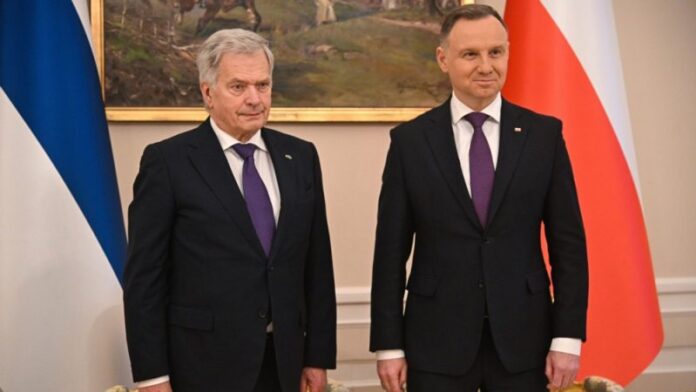Poland is ready to support Finland in defending its borders against hybrid attacks by Russia, President Andrzej Duda said during the meeting with his Finnish counterpart Sauli Niinistö on Monday, referring to the increased migration pressure on the Finnish border, according to Euractiv.
Both presidents, who met in Warsaw on Monday, discussed security and hybrid threats both from Russia and Belarus, including the migration pressure.
“We support Finland because we ourselves are dealing with such a situation on our border with Belarus. (…) Finland can count on our support and sharing our experience,” Duda told Niinistö.
Poland “consistently defends its borders” as part of its European commitments, he added.
Finland has started to build additional barriers to prevent migration from the direction of Russia the country is facing in recent days. Only on Saturday, about 70 asylum seekers reached the border point by bikes and scooters.
The Russians push them out and then close the barrier, making it impossible to return to the Russian side, said Capt. Jouko Kinnunen, the head of the southeastern border station of Vartius, as quoted by STT.
Today, Finland faces a similar migration pressure that Poland has tackled since 2021 – a hybrid attack carried out by pushing in groups of migrants on the border, Duda stressed.
The migration wave from the Middle East that Poland has experienced since Autumn 2021 is believed by both Poland and the European Union to be orchestrated by Alexander Lukashenko’s regime.
Overnight to November 18, Finland closed four border checkpoints on the eastern border. The authorities are going to close the entire border with Russia on Wednesday night, the Iltalehti newspaper reported, citing sources.
Russia is disappointed with Finland’s decision to potentially close all remaining border crossings, Presidential Spokesman Dmitry Peskov told reporters, as quoted by TASS.
“We had long-standing, very good relations with Finland (…) We regret that these relations have been replaced by an entirely Russophobic position, which the leaders of this neighbouring country have now begun to adhere to,” he said. He called it unlikely that Russia can influence the situation now.
“There is no dialogue as such, through no fault of ours. Actually, we were not the initiators of curtailing the dialogue,” Peskov insisted.


